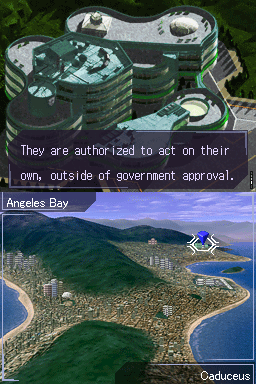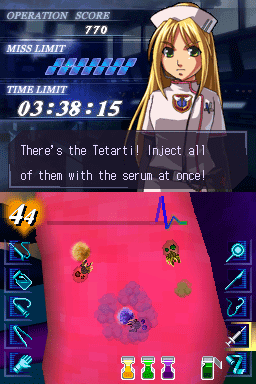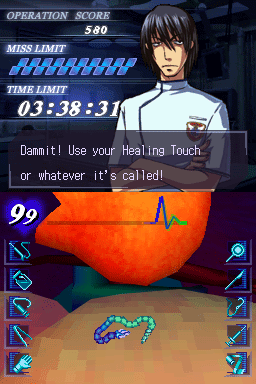
Several of my favorite games this console generation have been horribly marred by utterly ridiculous and preposterous plot points. Disaster Report's desolate tale of survival in the face of amazingly destructive natural disasters ravaging a city quickly turns into a conspiracy-laden tale of corporate greed and spirals into absurdity. The recently critically acclaimed Indigo Prophecy spends its final two hours tearing down a carefully honed, personal tale and replaces it with an imbecilic story involving mysterious cults and the end of the world via severe climate manipulation. And now there's Trauma Center.
Trauma Center should be, by all rights, a simple tale about a surgeon trying to do right. If I were a bit more optimistic, I might have hoped that it would have captured the spirit of Scorsese's Bringing Out the Dead. Trauma Center does start out simple, detailing the life of a lackadaisical surgeon as he botches surgery after surgery and then repeatedly chewed out by his superiors. Unfortunately just as you're getting the hang of patching up motorcyclists and excising tumors, it's revealed that you have the 'healing touch': the medical equivalent of being The Flash. The remainder of the game is then spent on a wild goose chase trying to squash a viral strain bluntly named GUILT that terrorists are unleashing upon the world. Along the way you're exposed to lip-serviced sociopolitical subjects such as doctor-assisted suicide so shoddily incorporated into the game as to be laughable. Doctor's opinions on right and wrong in Trauma Center conveniently bend with each tap of the screen, each flippant sentence reversing their beliefs like cards at a Texas Hold 'Em tournament.
Despite the cringe-worthy results, at least an attempt was made to seriously address some medical ethical quandaries. Sadly, this does little to compensate for the GUILT-ridden plot. Why did developer Atlus have to take a theme that's already full of life or death situations and try to inflate the tension with clichéd devices and twists? Was it really necessary to shift the game away from operating on serious illnesses and ailments to ones that resemble playing Ants in the Pants with a touch screen?

It is not as if it is impossible to have intimate melodramas in a game. The recent Nintendo DS adventure outing Trace Memory is a perfect example of a modern game that shows restraint and maturity concerning its subject matter. Oriented around an invention that can replace memories, Trace Memory chooses not to stray down the path of The Manchurian Candidate with political cover-ups, but stays rooted in its core themes of kindred estrangement and the nature of remembrance. And then there's Silent Hill 2 which, for all of its animated mannequins and pea soup fog, fails to waver from its simple story of a husband trying to reconnect with his departed wife.
If poignant, simple tales can be woven into the fabric of a game, why are so many other titles taking such cheap, hyperbolic approaches to drum up action when it's not necessary? After all, Trauma Center's theme material is, by its very nature, chock full of human drama, conflict and rife with as much heady subject matter as action. Medical dramas have long retained a leading spot in the weekly Nielsen television ratings over the years, and there's no reason why what drives ER couldn't be adapted to a proper game (except perhaps, ER: The Game). The similarly flawed Disaster Report could easily have focused solely on the tales and trials of those trapped and trying to survive. The length of a game virtually requires that they concentrate more on the characters than sustaining destructive explosions and floods (like many disaster films). After all, it's the drive to live and the length people will go to escape dangerous conditions that is memorable - not just yet another tidal wave crashing onto the shores.
The problem is that the plot devices and story elements wedged into these games completely detract from a fulfilling experience. Not every doctor is a superhuman being, capable of slowing time around him to make numerous scalpel incisions. Not every corporation's CEO is out to destroy all life around them, and a simple murder shouldn't spawn an flimsy web of conspiracies including cults and alien technology. Most importantly, the inclusion of any of these does not necessarily make a story any more compelling or interesting, especially when such outlandish plots are implemented at the expense of greater character-driven drama.

This isn't to say that all games must be quiet one-room, one-act melodramas, or that there's no place for sinister threats to national security in video games, but that it's time developers cease using these awful devices as a crutch for any and all situations. Would Lowrider's car-hopping action been improved if you had to bounce your car to a specific height or else an evil overlord would nuke Idaho? Of course not, but that's what it feels like developers are doing: looking for easy outs to drum up artificial drama past the opening act.
Certainly this can be construed as yet another critique of the shambling state of story in video games, and to some extent it is. However, the fundamentals of Indigo Prophecy and Trauma Center all showcase independent characters and a sturdy theme, at least until their respective plots lose the sense of lucidity they opened with. There was so much potential in the simple tales that were initially established; these character's personal journeys could have been just as exciting and gripping as nationwide impending doom. It's a shame that Atlus decide to go the route of the absurd rather than that of the introspective as Trauma Center could certainly have provided a unique and rich story, instead of peddling the lackluster and predictable use of ho-hum standbys such as governmental secret projects and pandemics. There's a time and a place for global meltdown, just not in Trauma Center.




#1 Benedict Oct 29, 2005 11:28am
I know exactly how you feel, and I agree. One of the big reasons I sold most of my video gaming devices (combined with a need for them to stop distracting me from schoolwork) was the deterioration of video game story and character devices. One of the better examples I can think of is Prince of Persia 1 versus Prince of Persia 2. The first game was great. Granted, the story had some rather trite elements, (an evil Vizier trying to do some giant evil) but the character interaction that developed between the Prince and whatever that woman's name was well-done. Then we get number two, which completely does away with anything resembling well-done character interaction or development. I blame marketing departments (ala Dilbert: The TV Show).